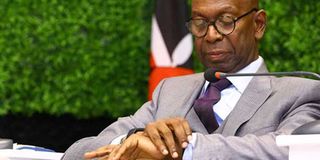Bob: “I was prepared for my exit, many Kenyans aren’t”

While Kenyans are reeling from the demise of telco boss Bob Collymore, interviews that the late corporate guru had since he was diagnosed with Acute Myeloid Leukaemia indicate he was prepared for July 1. PHOTO | NATION MEDIA GROUP
What you need to know:
- Bob dropped hints of how he had organised for his eventual departure from the world.
- The cancer that claimed Bob’s life was so rare that it never even ranks among the top ten in Kenya.
- He said that after nine months of treatment at UK’s University College London Hospitals from October 2017, he decided to “put his affairs in order”.
While Kenyans are reeling from the demise of Telco boss Bob Collymore, interviews that the late corporate guru had since he was diagnosed with Acute Myeloid Leukaemia — a blood cancer that presents by the rapid growth of abnormal cells in the bone marrow which interferes with the creation and operation of the normal blood cells — indicate he was prepared for July 1.
In an interview with his friend journalist Jeff Koinange, Bob has laced the dark reality of his imminent death with humour to drop hints of how he, a man known for his methodical management, had organised his departure from the world.
PUT AFFAIRS IN ORDER
He said that after nine months of treatment at UK’s University College London Hospitals from October 2017, he decided to “put his affairs in order”, and made deliberate decisions to meet people who had suffered and succumbed to his cancer such as famous musician Hugh Masekela who he met in Marrakech, Morocco.
In laughter, Bob said that he was upset that the treatment would take so long keeping him away from his company, but the fact that his years were too advanced for a transplant would mean that a relapse of the cancer would keep him from his young family.
Ink had not even dried on his marriage with artiste Wambui Kamiru whom he wedded in 2016.
CONTEXTUALISE PAIN
Mr Collymore also forced himself to contextualise his pain in the inequalities that the people in the country (Kenya) that had become home go through when they get cancer.
He said: “I was thinking had I not been a Safaricom or Vodacom employee it would have been difficult for sure … one of the things that I have been reflecting on in isolation because I spend a lot of time on my own is what happens to the poor Kenyan? One, they would not be diagnosed … because they do not have the money.
People are going to die”, he said. Bob knew he would not have survived past Christmas, 2017, and not many people in Kenya have the opportunity to have a moment to even plan for their exit when the time comes. Coincidentally, this is also the month last year when World Health Organisation’s cancer registry (Globocan) released data that showed that cancer claimed 32,987 lives in 2018 in Kenya.
FIGURES
The figures, double what the Ministry of Health estimated for that year, ranked oesophagus cancer as the leading killer accounting for nearly one in ten (13 per cent) of all deaths, followed by cervical (10 per cent), breast (8) and stomach (6) cancers.
Of all the 47,887 new cancer cases, men comprised two in every five new cases, 19,199 in total, while children up to 19 years were 3,272 cases, six per cent of the incidence.
The cancer that claimed Bob’s life was so rare that it never even ranks among the top ten in Kenya.
Anne Ng’ang’a, head of the National Cancer Control Programme, had attributed the deaths to late diagnosis where patients delay seeking care, and do so at advanced stages.
TREATMENT
Oncologist Andrew Odhiambo told Nation about cancer: “The question is ‘where are you seeking care?’ and ‘how much you can pay?’, and you can have one person in Kenya getting the same treatment as one would in New York … it is so unfortunate but it’s something we cannot run away from.”
Dr Odhiambo was referring to the inaccessibility of healthcare for poorer Kenyans and the disjointed health system where physicians cannot share medical notes of patients who visit different hospitals for the same treatment until further tests are run.
But even a man who goes for regular tests such as Bob may have missed on diagnosis.
PAIN
He said he had started feeling the initial symptoms of the cancer — a pain on his toe as though he had kicked a stone and cold — a doctor has prescribed vitamin A supplements fearing he had a deficiency.
When he had sought a second opinion from Nairobi Hospital’s Dr David Silverstein, the cardiologist ran more than 30 tests on him that had cost him $1,000, an equivalent of Sh102,000.
Dr Silverstein, he said, has recommended another test — a bone marrow aspirate — after which the doctor had recommended that he sees a specialist in the United Kingdom that very night when Bob said he would go when the elections cloud are cleared.
In University College London Hospitals in the UK, where he was informed that he was fit and strong enough to endure the gruelling treatment regimen that would eventually last for nine months and two weeks.
Eventually, he had returned home, getting palliative care until he passed on surrounded by family.





